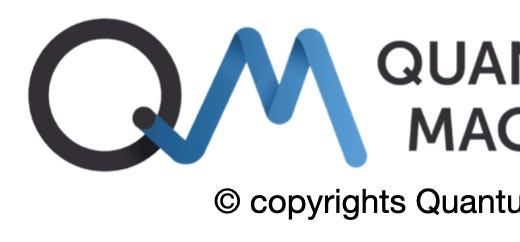Beyond big quantum players
Quantum Machines: Products and Technology of the Israel based start up
Hey there!
We're not even halfway through 2025, and it's already shaping up to be a landmark year for quantum. While headlines usually spotlight tech giants like Google, IBM, AWS, NVIDIA, and Microsoft, there's a parallel universe of startups quietly pushing the field forward. Thus, in the next few issues of The Quantum Vibe, I will talk about the players which I feel are making these significant contributions. This issue will be about Quantum Machines, an Israel based start up whose technology is based around the interface of classical and quantum control.
Founded: Itamar Sivan, 2018
Note: The content is not sponsored and represent author’s personal views.
Innovation
Our interaction with quantum computers is classical, and thus we need tools, strategies and softwares to establish this interface. That’s where Quantum Machines enters the stage — not building its own quantum computers but making tools orchestrating (coordinated control) them. Making it seamless for quantum and classical components to work together through an approach they call Hybrid Control. It’s a bit like being the conductor of a symphony: you might not be playing an instrument, but without your direction, the music falls apart.
Technology
In the grand landscape of quantum computing startups, Quantum Machines has carved out a unique niche. Born out of the realization that controlling quantum processors is a lot harder than it looks, the company set out to solve one of the most overlooked bottlenecks in the field: real-time, low-latency control of qubits.
At the heart of Quantum Machines’ offering is what they call Hybrid Control — a genuine rethinking of how to design quantum computing infrastructure. In today’s systems, quantum operations often depend on classical decisions. Hybrid Control means bringing classical processing as close to the qubits as possible. Quantum Machines does this through purpose-built hardware that blends real-time classical compute with quantum control electronics. This design allows for ultra-fast feedback, adaptive algorithms, and quantum error correction.
Products
Hardware
The company’s flagship hardware products live under the umbrella of the OPX (Orchestration Processor eXtreme) series. These are advanced quantum control systems designed to interface directly with quantum processors. Whether you're running a two-qubit experiment or working on scaling a system to hundreds or thousands of qubits, OPX is built to grow with you.
OPX+ is their high-speed, ultra-precise controller for lab experiments and mid-scale quantum systems.
OPX1000 is the powerhouse aimed at large-scale quantum computers.
This is supplemented with accessory products:
Octave: for converting signal frequencies (essential when working with microwave-driven qubits).
QDACs and QFilters: tools acquired from their merger with QDevil that generate clean, low-noise analog signals for delicate experiments.
QBox and QSwitch: for routing and managing signal paths efficiently.
Software
The OPX hybrid control is operated with the help of Quantum Orchestration Platform (QOP). At its core is QUA, a programming language designed from the ground up to unify quantum and classical operations. Unlike most quantum programming languages that bolt on classical instructions as an afterthought, QUA lets write pulse-level commands, conditionals, loops, and real-time feedback all in one place. This means one can write complex quantum algorithms that react to measurements in real time without relying on slow communication with a remote classical processor. The platform also plays well with others. QOP integrates with tools like Qiskit, making it easier for teams to plug in Quantum Machines' hardware to their existing software stacks.
Cryogenic control: recent expansion
Thanks to the QDevil acquisition, Quantum Machines now offer cryogenic-compatible components like:
QCage: a chip carrier that houses quantum processor chips in extreme cold.
QBoard: a non-magnetic sample holder for clean experiments.
QFilter: a low-pass filter that strips out noise at ultra-low temperatures.
By addressing both the control and the cryogenic environment, Quantum Machines is moving toward becoming a one-stop shop for quantum system integration.
Key partnerships
Quantum Machines’ products are used in national labs, university research centers, and commercial quantum companies around the world. Their tools support a wide range of quantum platforms, from superconducting circuits to spin qubits to neutral atoms. The flexibility means they don’t bet on a single computing platform, but they enable all of them. Whether it’s helping researchers fine-tune qubit calibrations, supporting quantum sensing experiments, or managing thousands of channels in a fault-tolerant prototype, their control systems are quietly doing the heavy lifting.
Quantum Machines' impact is further underscored by its collaborations with leading organizations in the quantum computing space:
Alice & Bob: Their testimony can also be found on Quantum Machines’ website.
NVIDIA: In collaboration with NVIDIA, Quantum Machines has integrated its OPX+ controller with NVIDIA's Grace Hopper Superchips to create the DGX Quantum system. This hybrid platform facilitates real-time quantum error correction and supports hybrid quantum-classical algorithms.
Rigetti Computing: Quantum Machines has partnered with Rigetti to implement AI-powered calibration of quantum processors, enhancing the performance and reliability of quantum computations.
Toyota Tsusho: As part of its expansion into the Japanese market, Quantum Machines has teamed up with Toyota Tsusho to provide advanced quantum control solutions, reflecting the growing industrial interest in quantum technologies.
Harvard University: Researchers have utilized Quantum Machines' platform to scale up quantum systems efficiently, facilitating advanced quantum experiments.
Massachusetts Institute of Technology (MIT): The Engineering Quantum Systems Group at MIT reported significant reductions in infrastructure development time using the OPX system, streamlining their research processes.
Quantum Machines' comprehensive approach to quantum control, encompassing both hardware and software solutions, positions it as a critical infrastructure provider in the quantum computing landscape. With substantial funding exceeding $280 million and a rapidly expanding global presence, the company is poised to continue its influential role in advancing quantum technologies. As the quantum computing field evolves, Quantum Machines' commitment to innovation, collaboration, and scalability ensures that it remains at the forefront of enabling practical and transformative quantum applications across various industries.
So, that’s that from this issue. Until next time, stay curious.




